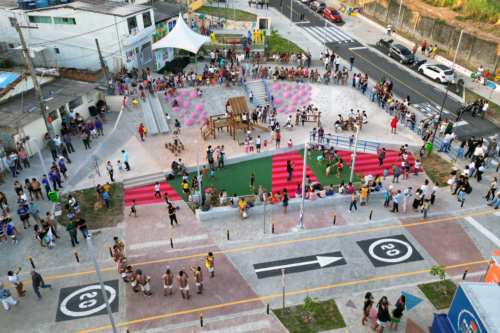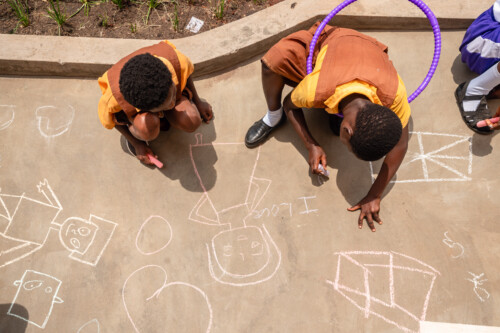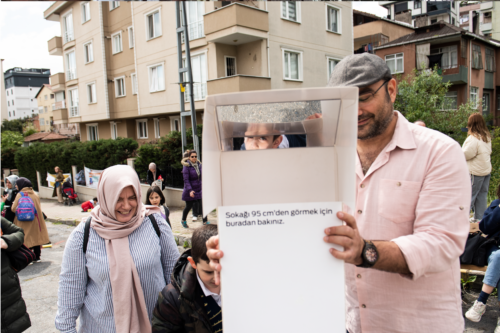With our mission to inspire a shift toward safe, sustainable, and healthy cities by transforming streets around the world, the Global Designing Cities Initiative (GDCI) continued to grow its team and global reach in 2021—offering workshops, webinars, technical assistance, and resources based on its two major publications: the Global Street Design Guide (GSDG) and Designing Streets for Kids (DSfK). Through virtual workshops, city-led implementations, and a new Streets for Kids training program, GDCI has trained 10,138 people around the globe, and supported 42 site transformation projects that led to the transformation of 13.1 km of streets.
As featured in NACTO’s newly-released annual report, here are some of our proudest activities and milestones from 2021:
This year marked GDCI’s sixth year of partnership with the Bloomberg Initiative for Global Road Safety (BIGRS). In 2021, a year into Phase III of this groundbreaking program, GDCI continued working in partnership with nine cities and one national agency: Recife and Salvador, Brazil; Bogota and Cali, Colombia; Addis Ababa, Ethiopia; Guayaquil and Quito, Ecuador; and Delhi and Maharashtra, India. Our team, paired with these local partners, facilitated training sessions on the GSDG, and continued to work with each city on technical guidance and design review to advance implementation of important safety projects. We were also pleased to launch our first Latin American regional trainings, as well as specific stakeholder trainings for police enforcement and journalists.

GDCI helped Recife, Brazil’s fourth-largest city, progress its road safety strategy by reviewing street designs and policies, holding trainings on the GSDG, and supporting project implementation and evaluation. The city, in turn, reclaimed public space by implementing several interim street transformations that reduce motor vehicle speeds and increase protection for all street users.

GDCI’s support to Salvador—through capacity-building trainings and technical assistance—helped the city implement its first interim Zone 30 project in the Bonfim Area, applying proven design techniques to self-enforce the new 30 km/h (~18.5 mph) speed limit.
Bogotá, Colombia

In Bogotá, GDCI worked alongside BIGRS partners to provide technical, design, and implementation support to the Barrios Vitales program, which aims to improve neighborhood quality of life through traffic calming and increased public space. Throughout 2022, the city aims to implement more of these neighborhood changes in order to achieve a city-wide impact.

Cali’s INEM school zone project, scheduled for implementation in 2022, will improve road safety conditions around a school and provide secure access for the school community. The design is developed through a series of engagement meetings, reflecting input from the students, parents, and neighborhood residents.
GDCI also partnered with the National Road Safety Agency (NRSA) in Colombia to support the third phase of the Pequeñas Grandes Obras (PGO) (Small Big Works) program, which aims to calm traffic and reduce the the number of crashes through on-street safety interventions. The team worked with contractors from 12 Colombian cities to improve project designs and build project delivery capacity.

Over 2021, GDCI helped advance Guayaquil’s road safety program by reviewing designs, data collection, and community engagement for six projects. GDCI was also a key participant at Guayaquil’s Mobility Week in September, with over 200 participants in attendance.

GDCI reviewed three municipal street design manuals, contributing to on-the-ground results in Quito’s streets. The Magdalena project added 4300 m² of pedestrian space to a mixed-use crash hotspot corridor, and became a central site for community events—it is now being maintained long-term.

In 2021, GDCI hosted its first hybrid workshop training in Addis Ababa, disseminating strategies and principles from the guide to cities across Ethiopia. Addis has also been advancing low-speed zones across the city, beginning with the demonstration projects that will be scaled up citywide in 2022.
Delhi, India
GDCI staff continued technical and policy training in Delhi, partnering to redesign two crash hotspots, providing design review and capacity-building support for segments of a 540km road improvement project, and hosting a Police Training on safer streets, with 120 police personnel in attendance.
Maharashtra/Mumbai, India
In Maharashtra State and Mumbai, GDCI hosted a second round of Journalist Trainings, which will continue in 2022 with an additional capacity building training. GDCI also supported Maharashtra Transport and city agencies in developing school zone safety initiatives and corridor redesigns in Nashik.

Working with Bloomberg Associates and Comune di Milano, GDCI continued to support Milan’s Piazze Aperte program, which included 4 interim site interventions in 2021, reclaiming 4 km² of streets and public spaces. In May, GDCI also partnered with the city to release the Italian translation of the Global Street Design Guide, available for purchase or free download.
This year also marked major milestones for our Streets for Kids program, which looks at cities through the lens of children and their caregivers. Since last year’s release of Designing Streets for Kids—which was created with the support of Bloomberg Philanthropies, Bernard Van Leer Foundation, FiA Foundation, and Fondation Botnar— over 6500 individuals downloaded the guide. In 2021, the guide also received honorable mention in the book category of the Environmental Design and Research Association’s “Great Places Awards” and the Prince Michael International Road Safety Award. In 2022, translations of Designing Streets for Kids will be available in French, Portuguese, Spanish, and Turkish.
This year also marked the launch of the Streets for Kids online training program, the first of GDCI’s training programs offered fully virtually. These in-depth online trainings have sparked conversations about physical design changes to the local streets in cities including: Cape Town, South Africa; Colima, Mexico; Kazan, Russia; Lima, Peru; Pasig (Metro Manila), Philippines; Tbilisi, Georgia; Tulsa, Oklahoma, USA; Kigali, Rwanda, and Udaipur, India. We also continued our partnerships with Tirana, Albania; Fortaleza, Brazil; and Santiago, Chile, transforming streets into child-focused public spaces.
“For many years, [the Ghent mobility department] has been focusing on schools & mobility, and we wish to expand our views to focus on networks, movements, and connections. We used your design guide as an inspiration for our vision and plan on child & youth mobility.”
-Marijn Gouweloose (Ghent, Belgium)
“As an architect, I am working on a children’s streets program in Siberia, and developing a methodology for including this direction in the municipal program. Based on this guide, I have developed solutions for our climate and instructions for choosing priority streets.”
-Anastasia Pochotovaia (Krasnoyarsk, Russia)

GDCI helped Fortaleza transform streets near a neighborhood school with safety and play upgrades, closing adjacent streets to vehicular traffic and creating a pedestrian-only play plaza for kids and families to spend time outside of school.

In partnership with local nonprofit Qendra Marredhenie and Tirana’s Department of Transport and Mobility, GDCI helped convert an underused parking lot next to a local school into a dynamic play space. An expanded pedestrian area and wider painted crosswalks form the prototype for the city’s new Safe School Street Program.

GDCI and local partner Ciudad Emergente developed an at-home engagement kit, allowing the team to test new engagement techniques and better elevate kids’ voices. The resulting project is a new neighborhood gathering space, created by transforming grey pavement into a colorful area serving both residents and school children.
Early Childhood Development
GDCI provides technical assistance and training to the Bernard van Leer Foundation’s Urban95 cities and supports them in scaling up programs and policies. As part of this program, focusing on early childhood development, the team has been working with cities in Turkey, Ethiopia, and Brazil to develop and implement demonstration projects, as well as hosting capacity building programs based on the Designing Streets for Kids guide.

GDCI is helping Addis Ababa develop play streets and foster an environment for city staff, caregivers, and children to gather and express their vision for these shared spaces. Each Sunday in 2022, eleven streets citywide will be temporarily closed to cars, creating even more safe spaces for local residents to safely play outside.

Following the 2019/2020 success of Zümrütevler Plaza in Istanbul’s Maltepe district, GDCI continued working with the city of Istanbul to design and implement a comprehensive kids engagement project that includes a new neighborhood plaza, a play street, and a cycling corridor. GDCI also supported the launch of play streets program in Sisli, another district in Istanbul, and will continue to be involved as the program is scaled up. With support from Marmara Municipalities Union, GDCI also released the Turkish translation of the Global Street Design Guide, which is available as a free pdf.
Brazil

Throughout 2021, GDCI conducted broad and targeted workshops on planning and designing cities through an early childhood development lens, including in-depth work on safe routes to school, intersection redesigns, and public space planning with four cities. GDCI provided design review and capacity-building to support projects in these four cities, also expanding on engagement, metric collection, and interim implementation topics.
Expanding Our Team & Global Reach
In 2021, GDCI projects—and insights from our team members—were featured in 60 news stories from around the world, in many prominent outlets from Brazil to New Zealand, Ecuador to India.
In addition to releasing translations of the Global Street Design Guide in Italian and Turkish, we also partnered with iRAP to translate the iRAP Star Ratings of NACTO-GDCI’s Global Street Design Guide resource into French, Portuguese, and Spanish. As part of the UN Global Road Safety Week campaign, we also co-developed three detailed animations to show how lower speeds on streets around the world protect people and enable healthy, more sustainable choices such as walking and cycling.
Also this year, joining the list of 100+ cities, regions, countries, and organizations across the world who have endorsed the Global Street Design Guide are the cities of Quito, Ecuador and Slavutich, Ukraine. The guide also received a national endorsement from the Federal Democratic Republic of Ethiopia. The GSDG—which is now available in English, Chinese, Italian, Portuguese, Spanish, and Turkish—has been downloaded over 40,000 times!
We also added new team members to the GDCI crew. In March, we welcomed Paul Supawanich as the Associate Director of Programs, to help lead ongoing work with Streets for Kids, the Bloomberg Initiative for Global Road Safety, and GDCI’s other transformative program areas. And this May, we made two more hires: Uditi Agarwal as the India Program Manager, overseeing the team’s interventions for safer streets and safer mobility; and Francisca Benitez as Program Associate, contributing to the successful operation of multiple projects and work streams across GDCI.
We have a number of exciting developments in the works for 2022, which we can’t wait to share. In the meantime, we hope you will join us in celebrating these milestones from the past year as we continue in our mission to transform streets around the world into places that are safe, healthy, and joyful for everyone.
















